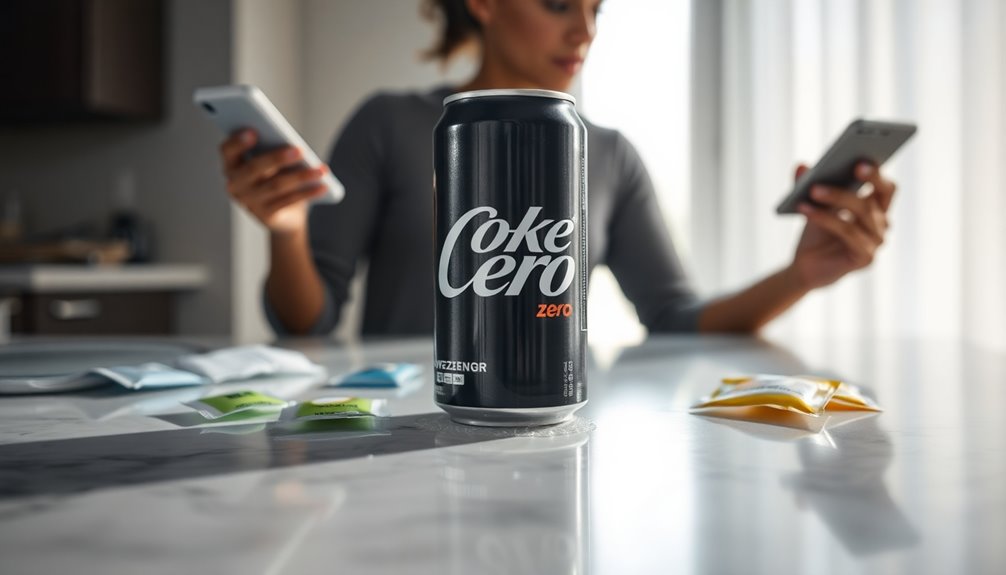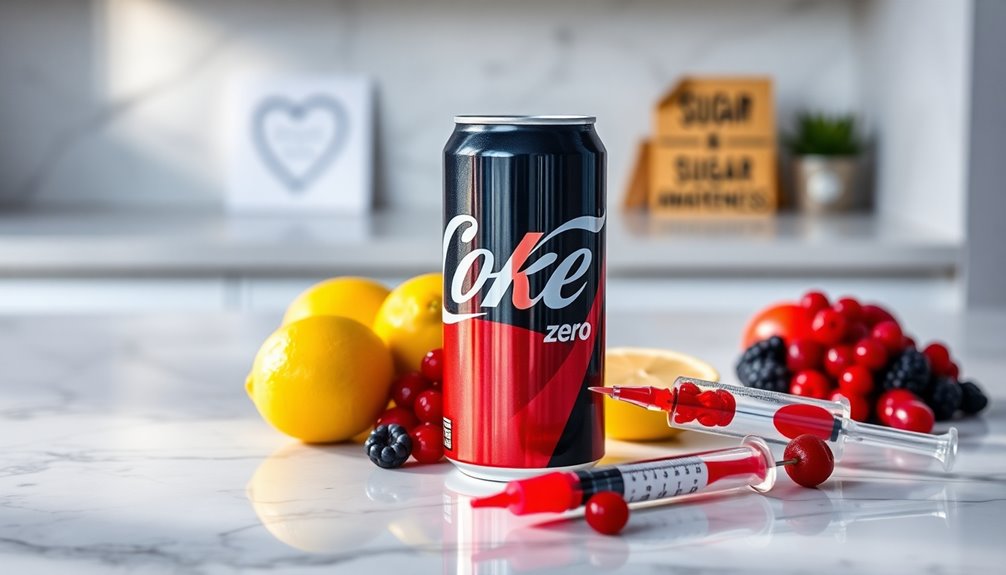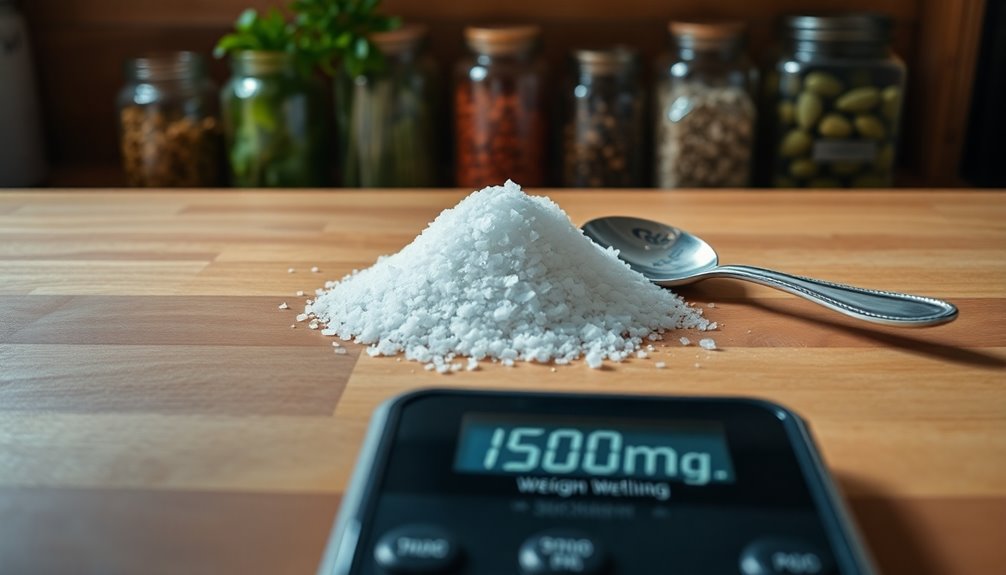Coke Zero might seem like a healthier soda choice, but its ingredients raise some flags. You'll find carbonated water, caramel color, phosphoric acid, aspartame, and acesulfame potassium in the mix. Both sweeteners can disrupt your gut microbiome and may lead to weight gain. Plus, aspartame is possibly carcinogenic and linked to oxidative stress. Phosphoric acid could affect your bone health over time. Compared to regular Coke, Coke Zero has zero calories but offers little nutritional value. If you're curious about healthier alternatives or the broader implications of these ingredients, there's more to explore.
Key Takeaways
- Coke Zero contains artificial sweeteners like aspartame and acesulfame potassium, which may disrupt gut health and contribute to weight gain.
- Long-term consumption of aspartame raises concerns about oxidative stress, chronic inflammation, and potential carcinogenic effects.
- Phosphoric acid in Coke Zero can lower bone mineral density and increase the risk of kidney disease.
- Coke Zero offers zero calories, contrasting with regular Coke's high sugar and calorie content, but both lack nutritional value.
- Healthier alternatives to Coke Zero include sparkling water, kombucha, and homemade teas, promoting better overall health.
Overview of Coke Zero Ingredients

Coke Zero, officially known as Coke Zero Sugar since 2017, boasts a blend of ingredients designed to mimic the classic cola taste without the calories.
Its formula includes carbonated water, caramel color, phosphoric acid, aspartame, and acesulfame potassium. Aspartame and acesulfame potassium are key sweeteners that give Coke Zero its calorie-free and sugar-free appeal, with a 12-ounce can containing about 200 mg of aspartame.
However, these ingredients have raised concerns: aspartame may lead to oxidative stress and potential weight gain, while acesulfame potassium might disrupt your gut microbiome.
Additionally, phosphoric acid is linked to reduced bone mineral density and increased kidney disease risk. The caramel color, derived from ammonium, produces 4-methylimidazole, classified as a carcinogen in California.
Sweeteners and Their Risks

While many people enjoy the taste of Coke Zero, the sweeteners it contains—aspartame and acesulfame potassium—have sparked significant health concerns.
Here are a few potential risks to evaluate:
- Weight Gain: Both artificial sweeteners can lead to changes in your gut microbiome, potentially contributing to weight gain.
- Oxidative Stress: Long-term consumption of aspartame may cause oxidative stress and chronic inflammation, raising safety concerns.
- Carcinogenic Potential: The International Agency for Research on Cancer classified aspartame as possibly carcinogenic in 2024, highlighting the need for caution.
The FDA does set an acceptable daily intake for aspartame, but some studies suggest limiting your intake due to these health risks. Additionally, the consumption of anti-inflammatory herbs may provide natural alternatives to combat inflammation caused by these sweeteners.
Being informed can help you make better choices about Coke Zero.
Health Concerns of Ingredients

When considering what you consume, it’s essential to be aware of the health concerns associated with Coke Zero’s ingredients. Some studies suggest that artificial sweeteners found in Coke Zero may lead to digestive issues or influence gut bacteria, raising questions about their long-term effects on overall health. Additionally, individuals are often advised to limit soda intake for certain medical procedures, prompting inquiries about coke consumption before colonoscopy. Understanding these health concerns can help consumers make informed choices about their beverage options.
Coke Zero contains aspartame and acesulfame potassium, linked to weight gain and gut microbiome imbalances. The phosphoric acid in Coke Zero may lower bone mineral density, especially in women, and increase the risk of kidney disease.
Additionally, caramel color can produce 4-methylimidazole (4-MEI), a carcinogen recognized under California's Proposition 65. Regular consumption raises concerns about chronic inflammation and metabolic syndrome due to these artificial sweeteners.
The American Heart Association warns against long-term use of Coke Zero, citing mixed health outcomes related to its ingredients. Being informed helps you make better choices for your health.
Coke Zero vs. Regular Coke

When you compare Coke Zero to regular Coke, the differences in caloric content and ingredients are striking.
While Coke Zero offers a zero-calorie option with artificial sweeteners, regular Coke packs in 140 calories and 39 grams of sugar per serving.
Understanding these distinctions can help you weigh the health impacts of both beverages.
Caloric Content Comparison
How does the caloric content of Coke Zero stack up against regular Coke? When you're watching your weight, understanding these differences is essential:
- Coke Zero: Contains 0 calories per 12 fl oz serving, thanks to artificial sweeteners like aspartame and acesulfame potassium.
- Regular Coke: Packs about 140 calories per 12 fl oz, mainly due to its 39 grams of sugar from high-fructose corn syrup.
- Sugar Intake Impact: Choosing Coke Zero can greatly lower your daily caloric intake, making it an appealing option for weight management.
While Coke Zero has no added sugars, the health concerns surrounding artificial sweeteners should be considered.
Ultimately, your choice affects not just caloric content, but also your overall health and sugar intake.
Ingredient Differences Explained
While both Coke Zero and regular Coke share some common ingredients, their sweetening agents and health implications differ markedly.
Coke Zero uses artificial sweeteners like aspartame and acesulfame potassium, making it a calorie-free option. In contrast, regular Coke is sweetened with high-fructose corn syrup, which contributes about 39 grams of sugar per 12-ounce serving and is linked to health risks like metabolic syndrome and obesity.
While Coke Zero contains similar ingredients such as caramel color and phosphoric acid, it avoids the natural sugars found in regular Coke. This makes Coke Zero appealing for those looking to reduce sugar intake, with a shorter ingredient list and fewer carbohydrates.
Ultimately, your choice may reflect your concerns about health implications.
Health Impact Analysis
Although both Coke Zero and regular Coke are popular choices, their health impacts differ markedly due to their ingredient compositions.
Coke Zero contains artificial sweeteners like aspartame, which may pose health risks, while regular Coke is packed with sugar.
Here's a quick comparison:
- Coke Zero: Artificial sweeteners linked to weight gain, metabolic syndrome, and potential cancer risk.
- Regular Coke: High in calories (140 per 12 oz) and sugar (39 grams), contributing to obesity and insulin resistance.
- Both: Low nutritional value and concerns over diet sodas associated with increased risks of stroke and dementia.
In the end, neither option is truly healthy, so it's wise to explore alternatives that provide better nutritional value.
Sugar Awareness and Risks

You might be surprised to learn how much hidden sugar lurks in everyday items, including diet sodas like Coke Zero.
This excess sugar can lead to serious health risks, from obesity to diabetes and heart disease. Staying aware of your sugar intake and reading nutrition labels is essential for safeguarding your health.
Hidden Sugar Sources
Many people may not realize that hidden sugars lurk in a variety of processed foods, from breakfast cereals to smoothies, greatly impacting daily sugar intake.
These added sugars can sneak into your diet, leading to potential negative health effects.
To stay informed, you should watch out for:
- Breakfast cereals: Often marketed as healthy but loaded with sugars.
- Smoothies: Even store-bought ones can contain high levels of added sugars.
- Sauces and condiments: Ketchup and salad dressings can have surprising sugar content.
Additionally, staying informed about personal debt forgiveness options can help you manage your finances better while making healthier food choices.
Health Risks of Sugars
Hidden sugars not only accumulate in everyday foods but also pose significant health risks that can affect your long-term well-being.
Consuming sugar-sweetened beverages and foods with added sugars increases your calorie intake, contributing to weight gain and the risk of developing type 2 diabetes. The American Heart Association advises limiting added sugars to 6 teaspoons for women and 9 for men to mitigate these health risks.
High fructose corn syrup, a common food additive, can lead to metabolic syndrome when consumed in excess. While some turn to artificial sweeteners, they don't always solve the problem. Additionally, consuming excessive sugars can lead to lower cognitive function, which highlights the importance of managing your sugar intake for overall health.
Educating consumers about reading labels and understanding sugar's impact is essential for maintaining a healthier lifestyle and reducing health risks associated with excess sugar consumption.
EWG Food Scores Explained

Understanding the EWG Food Scores system can help you make healthier food choices, as it evaluates items on a scale where lower scores indicate better nutrition.
This system focuses on three main areas:
- Nutritional Assessment: It considers vitamins, minerals, and calorie density, highlighting beneficial ingredients.
- Ingredient Concerns: This evaluates harmful additives and artificial substances, like aspartame found in Coke Zero, which is categorized as a moderate concern additive.
- Processing Score: It measures how much a product has been altered from its original state, with higher scores often linked to artificial ingredients.
Alternatives to Coke Zero

If you're looking to cut back on Coke Zero, there are plenty of invigorating alternatives that can satisfy your cravings without the added sugars or artificial ingredients.
Sparkling water and mineral water offer the carbonation you love, minus the artificial sweeteners. For a twist, try kombucha; this fermented tea isn't only fizzy but also packed with probiotics that promote gut health.
You can also enjoy homemade teas infused with natural herbs and fruits, perfect for any season. Fresh fruit smoothies are another fantastic option—they're sweet, nutritious, and hydrate you while delivering essential nutrients. Additionally, incorporating detoxifying juices like lemon or ginger juice can further enhance your hydration and well-being.
Gradually embracing these healthier options can enhance your overall nutrition and hydration, making your shift away from Coke Zero enjoyable and satisfying.
Frequently Asked Questions
Is There Anything Unhealthy About Coke Zero?
You might want to think twice about Coke Zero if you're concerned about health.
While it's marketed as a low-calorie alternative, it contains artificial sweeteners linked to weight gain and metabolic issues.
Plus, ingredients like phosphoric acid can impact bone health and kidney function.
Consuming it regularly could increase your risk of cardiovascular problems and diabetes, making it important to evaluate these potential health risks before reaching for another can.
What Zero Soda Has No Aspartame?
Looking for a zero soda without aspartame? You've got some tasty options!
Brands like Zevia and A&W Diet Root Beer use stevia or sucralose instead.
If you prefer something simpler, sparkling water or flavored seltzers like LaCroix and Bubly are great choices, too.
Want to get creative? Infuse your water with fruits or herbs for a revitalizing, natural drink.
Always check labels, though, to verify you're picking an aspartame-free beverage!
Is 2 Cans of Coke Zero a Day Bad?
Drinking 2 cans of Coke Zero daily mightn't be the best choice for your health.
You're exposing yourself to aspartame and other ingredients that some studies link to weight gain and metabolic issues.
Regular consumption could also contribute to potential risks like reduced bone density and cognitive problems.
It’s wise to evaluate moderation and explore healthier beverage options to avoid long-term health consequences. Additionally, consuming high levels of caffeine can lead to issues such as insomnia, anxiety, and increased heart rate. In the long term, excessive consumption of caffeinated beverages can have negative effects on the cardiovascular system and overall health. Furthermore, it’s important to consider caffeine’s impact on artistic skills, as some studies suggest that high levels of caffeine can impair fine motor skills and creativity. Therefore, it’s crucial to carefully consider one’s beverage choices and prioritize moderation to maintain good health and well-being.
Your choices can greatly impact your well-being.
What Is the Healthiest Coke to Drink?
When you reach for a can of Coke, think of it as choosing between two paths in a lush forest.
If you're after the healthiest option, Coke Zero may seem appealing, but its artificial sweeteners raise some concerns.
Instead, consider nature's offerings: water and green tea. They nourish your body without the drawbacks of added sugars or chemicals.
Conclusion
In a world where choices bubble up like fizzy drinks, understanding Coke Zero's ingredients can help you make informed decisions. While it offers a guilt-free sip, the hidden risks of artificial sweeteners and health concerns may linger like an aftertaste. Balancing your cravings with healthier alternatives can keep your taste buds happy without compromising your well-being. So, take a moment to savor the knowledge you've gained and choose wisely, because your health is worth more than a quick refreshment.









